James Boyle: The Public Domain: Enclosing the Commons of the Mind (2008)
Filed under book | Tags: · commons, copyright, filesharing, intellectual property, public domain

In this enlightening book, James Boyle describes what he calls the range wars of the information age – today’s heated battles over intellectual property. Boyle argues that just as every informed citizen needs to know at least something about the environment or civil rights, every citizen should also understand intellectual property law. Why? Because intellectual property rights mark out the ground rules of the information society, and today’s policies are unbalanced, unsupported by evidence, and often detrimental to cultural access, free speech, digital creativity, and scientific innovation. Boyle identifies as a major problem the widespread failure to understand the importance of the public domain – the realm of material that everyone is free to use and share without permission or fee. The public domain is as vital to innovation and culture as the realm of material protected by intellectual property rights, he asserts, and he calls for a movement akin to the environmental movement to preserve it. With a clear analysis of issues ranging from Jefferson’s philosophy of innovation to musical sampling, synthetic biology and Internet file sharing, this timely book brings a positive new perspective to important cultural and legal debates. If we continue to enclose the ‘commons of the mind’, Boyle argues, we will all be the poorer.
Publisher Yale University Press, 2008
Creative Commons Attribution-Noncommercial-Share Alike 3.0 License.
ISBN 0300137400, 9780300137408
Length 315 pages
PDF (PDF)
PDF (PDF; updated on 2012-8-7)
PDF (PDB)
Critical Art Ensemble (1994-2006)
Filed under book | Tags: · activism, art, biotechnology, control society, copyright, cultural resistance, tactical media, transgenics, virtuality
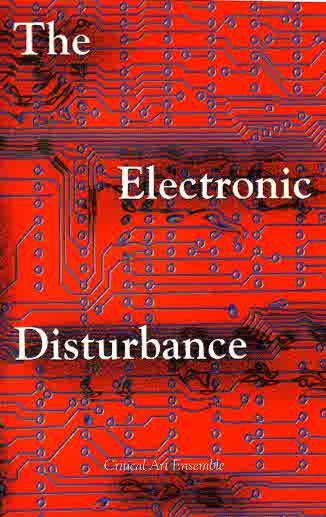
The Electronic Disturbance (1994)
The Critical Arts Ensemble is a virtual collective. This collection of essays and short pieces examines the changing rules of cultural and political resistance: “The current technological revolution has created a new geography of power relations — as data, human beings confront an authoritarial impulse that thrives on absence. As a virtual geography of cognizance and action, resistance must assert itself in electronic space.”
Publisher Autonomedia, May 1994
ISBN 1570270066
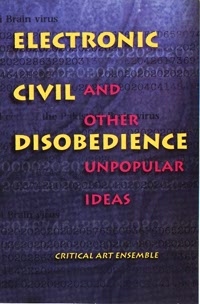
Electronic Civil Disobedience and Other Unpopular Ideas (1997)
In the age of global, nomadic capital, the CAE attempts to lay the foundation for the growth of nomadic resistance. Utilizing the tools of its enemy, the CAE suggests that a new cultural and political resistance is possible. Fusing a situationist-influenced concept of contestational art, an understanding of the parallel nature of cultural and political action borrowed from Gramsci, and a hacker’s deep understanding of how new technology functions, ECD is a launch point for debating the nature of power and resistance in the information age.
Publisher Autonomedia, May 1997
ISBN 9781570270567
commentary (Stefan Wray)
authors
publisher
PDF
View online, cont. (La Résistance électronique et autres idées impopulaires, French)
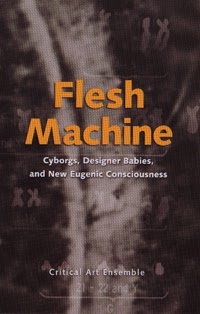
Flesh Machine: Cyborgs, Designer Babies, and New Eugenic Consciousness (1998)
Having elsewhere explored the dimensions of social and political control in electronic culture, the Critical Arts Ensemble here turns full frontal towards the body, arguing that utopian promises of virtuality are simple distractions from the real project: the deployment of biotechnologies upon the bodies of citizens in the service of the transnational order.
Publisher Autonomedia, March 1998
ISBN 9781570270673
PDF
PDF (Η μηχανή της σάρκας: Εκδόσεις των ξένων, Greek)
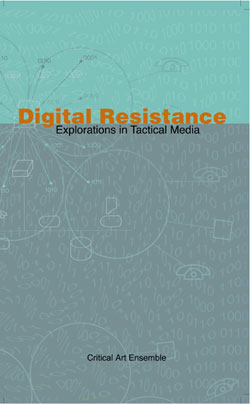
Digital Resistance: Explorations in Tactical Media (2000)
Essays in cultural politics and technology from the collective authors of Electronic Disturbance, Electronic Civil Disobedience and Flesh Machine. Chapters in this new volume include “Electronic Civil Disobedience and the Public Sphere,” “The Mythology of Terrorism on the Net,” “The Promissory Rhetoric of Biotechnology,” “Observations on Collective Cultural Action,” “Recombinant Theater and Digital Resistance,” “Contestational Robotics,” “Children as Tactical Media Participants,” and “The Financial Advantages of Anti-Copyright.”
Publisher Autonomedia, April 2000
ISBN 1570271194
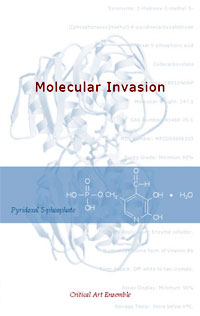
The Molecular Invasion (2002)
Having exhausted the possibilities for geographic colonial expansion, as well as reaching the fiscal limitations of virtual space, capital begins its invasion of a new frontier — organic molecular space. The Critical Art Ensemble began mapping this development in Flesh Machine (Autonomedia, 1998) by examining the use of reproductive technologies and their promise for achieving an intensified degree of control over worker and citizen. The Molecular Invasion acts as a companion to this first book by mapping the politics of transgenics, and offering a model for the creation of a contestational biology, as well as providing direct interventionist tactics for the disruption of this new assault on the organic realm.
Publisher Autonomedia, April 2002
ISBN 1570271380, 9781570271380
140 pages
PDF
PDF (Molekularna invazija, Croatian)

Marching Plague: Germ Warfare and Global Public Health (2006)
The sixth Critical Art Ensemble book offers a radical reframing of the rhetoric surrounding germ warfare. After refuting the idea that massive biological attack is a probable future occurrence, the book goes on to argue that biological weapons programs primarily serve the economic interests of the military-security complex, squandering resources needed to fight the massive loss of life each year from emerging infectious diseases. The book also includes two appendices examining the case of the U.S. Justice Department against Steve Kurtz, for which the original manuscript of the book was seized in the state’s investigation.
Publisher Autonomedia, 2006
ISBN 157027178X, 9781570271786
148 pages
review (Randall Packer)
authors
publisher
Christopher M. Kelty: Two Bits: The Cultural Significance of Free Software (2008–) [EN, ES]
Filed under book | Tags: · commons, copyright, floss, free software, open source, software
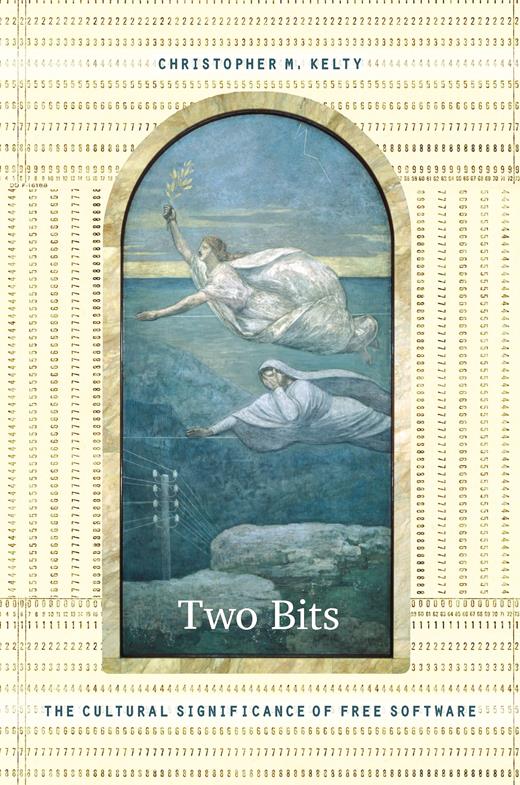
“In Two Bits, Christopher M. Kelty investigates the history and cultural significance of Free Software, revealing the people and practices that have transformed not only software, but also music, film, science, and education. Free Software is a set of practices devoted to the collaborative creation of software source code that is made openly and freely available through an unconventional use of copyright law. Kelty shows how these specific practices have reoriented the relations of power around the creation, dissemination, and authorization of all kinds of knowledge after the arrival of the Internet.
Two Bits also makes an important contribution to discussions of public spheres and social imaginaries by demonstrating how Free Software is a “recursive public”-a public organized around the ability to build, modify, and maintain the very infrastructure that gives it life in the first place.Drawing on ethnographic research that took him from an Internet healthcare start-up company in Boston to media labs in Berlin to young entrepreneurs in Bangalore, Kelty describes the technologies and the moral vision that binds together hackers, geeks, lawyers, and other Free Software advocates. In each case, he shows how their practices and way of life include not only the sharing of software source code but also ways of conceptualizing openness, writing copyright licenses, coordinating collaboration, and proselytizing for the movement. By exploring in detail how these practices came together as the Free Software movement from the 1970s to the 1990s, Kelty also shows how it is possible to understand the new movements that are emerging out of Free Software: projects such as Creative Commons, a nonprofit organization that creates copyright licenses, and Connexions, a project to create an online scholarly textbook commons.”
Publisher Duke University Press, 2008
ISBN 0822342642, 9780822342649
xvi+378 pages
Book website
Publisher (EN)
Publisher (ES)
Two Bits: The Cultural Significance of Free Software (English, 2008, 3 MB, HTML (ZIP), updated on 2023-3-14)
Two Bits: la trascendencia cultural del software libre (Spanish, 2019, 8 MB, added on 2023-3-14)

